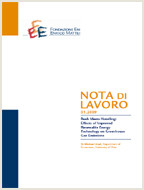Futures Price Volatility in Commodities Markets: The Role of Short Term vs Long Term Speculation

07.05.2013
Matteo Manera, Marcella Nicolini, Ilaria Vignati
C32, G13, Q11, Q43
Commodities Futures Markets, Speculation, Scalping, Working’s T, Data Frequency, GARCH Models
Energy: Resources and Markets
Giuseppe Sammarco
This paper evaluates how different types of speculation affect the volatility of commodities’ futures prices. We adopt four indexes of speculation: Working’s T, the market share of non-commercial traders, the percentage of net long speculators over total open interest in future markets, which proxy for long term speculation, and scalping, which proxies for short term speculation. We consider four energy commodities (light sweet crude oil, heating oil, gasoline and natural gas) and seven non-energy commodities (cocoa, coffee, corn, oats, soybean oil, soybeans and wheat) over the period 1986-2010 analyzed at weekly frequency. Using GARCH models we find that speculation significantly affects volatility of returns: short term speculation has a positive and significant impact on volatility, while long term speculation generally has a negative effect. The robustness exercise shows that: i) scalping is positive and significant also at higher and lower data frequencies; ii) results remain unchanged through different model specifications (GARCH-in-mean, EGARCH, and TARCH); iii) results are robust to different specifications of the mean equation.
